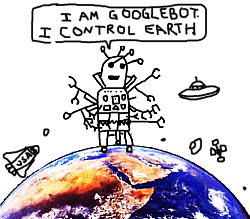Google Book Search Settlement Agreement Is Fair, Argue Author and Publisher Groups
SAN FRANCISCO, May 10, 2010 – Contrary to many authors’ deep-seated worries, the Google book search settlement puts them in complete control of the fate of their work online, argues a lawyer for the Association of American Publishers.
SAN FRANCISCO, May 10, 2010 – Contrary to many authors’ deep-seated worries, the Google book search settlement puts them in complete control of the fate of their work online, argues a lawyer for the Association of American Publishers.

Fear and loathing in cyberspace: "A vocal minority" of authors object to the controversial Google Book Search Settlement because they simply "dislike or fear" Google, says Authors Guild Executive Director Paul Aiken. Image courtesy of ftrain's Paul Ford.
“In fact what we did with this agreement, what we regained for them was the ability to exert the control that they had lost when Google just decided to go ahead and scan the books and start displaying little snippets,” said Allan Adler, AAP vice president for legal and government affairs, in an interview.
“As a member of the [settling] class, you have the right to claim your works, and control anything Google can do with them,” he said. “You could tell Google, having scanned the work, they can do nothing with that scan.”
The AAP and the Authors Guild last November submitted an amended agreement to a federal district court in New York that would settle a class action lawsuit against Google for violating their members’ copyrights by scanning millions of books, and making “snippets” of the books available to the public online. To date, Google has scanned more than 12 million books from various academic libraries in the United States and abroad.
The groups want to breathe new life into old books and to build a market for them via Google’s proposed digital book service. They argue that this is only possible if a critical mass of books are offered through the service, which is why they want to make the settlement scheme an opt-out one.
Nevertheless, some authors and their associations oppose the settlement. They argue that not enough notice was given, and that the agreement may force some authors into a contract they don’t understand.
About 6,800 authors and their estates have chosen not to participate. That means that they’re free to launch additional lawsuits against Google if they feel that its activities still infringe upon their work.
Adler dismissed those claims.
“The argument that ‘we didn’t know about this’ is just ridiculous,” he said. “At some level, you have to say: Look, you’re an adult, this activity means something to you, clearly.”
The settlement agreement does make many accommodations for authors – including giving them the choice at any time to block digital access to their books. Other provisions of the settlement specify that the default setting for in-print books would be no display online unless explicitly authorized by their rights holders. And in some cases, authors of out-of-print books don’t even have to go through the steps usually needed to regain the exclusive rights to their books.
Adler noted that the settlement specifically addresses author-publisher contract issues, and provides revenue splits and resolution procedures for contracts that either didn’t mention digital rights, or where the language is fuzzy.
The question of how well the authors and publishers have been accommodated in the settlement is important because it’s a test by which the agreement will be measured in determining whether it should be approved.
“The issue before the court is: Is this fair, reasonable and adequate to class members? That is the only issue [Judge Denny Chin] is deciding,” says Jonathan Band, a Washington, D.C., lawyer who has tracked the lawsuit closely on behalf of his client, a consortium of libraries.
Band and other panelists will discuss the impact of the Google Book Search Settlement and its implications for the licensing of digital books Tuesday at the Intellectual Property Breakfast Club meeting in Washington.







